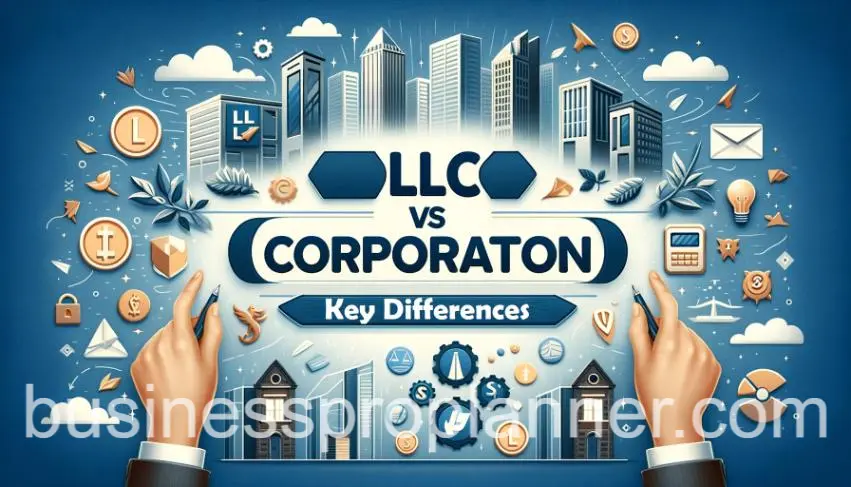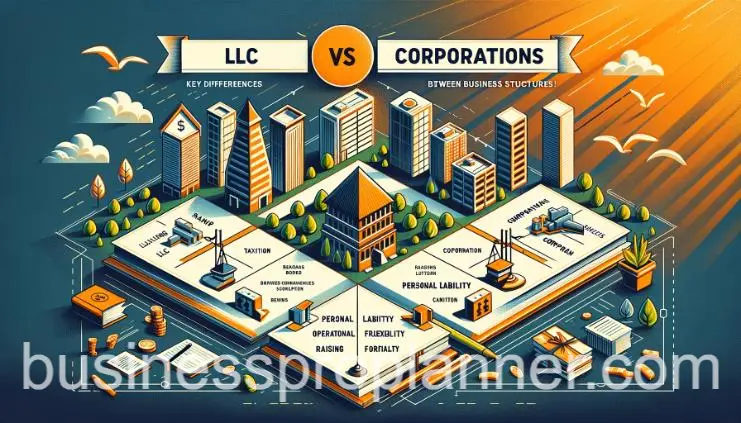When starting a business, choosing the right business structure is crucial. Limited Liability Companies (LLCs) and Corporations are popular choices, each offering unique benefits and limitations. This decision impacts taxation, personal liability, and your ability to attract shareholders. Every business owner must compare LLC vs Corporation because it is crucial for starting a new business or modifying an existing structure.
Introduction
Forming a new business entity requires choosing from several legal structure options. Entrepreneurs commonly consider two setups: limited liability companies (LLCs) and corporations.
Selecting the right business structure is an important foundational decision that impacts many aspects of a company, from operations and taxes to record-keeping requirements and investor options. Both LLCs and corporations have their own set of pros and cons across these critical areas.
Fully understanding these differences enables business owners to decide whether an LLC or corporation better fits their goals. Analyze factors, such as taxation and management structure, for a well-informed choice.
- How profits/losses are taxed
- Limitations on personal liability
- Operational flexibility
- Raising capital through equity
- Ongoing legal formalities
This guide compares LLCs and corporations across these key areas to help business owners select the ideal structure.
What is an LLC?
An LLC, or Limited Liability Company, is a popular choice, especially for small businesses. It blends elements of sole proprietorships, partnerships, and corporations, offering flexibility and protection. Some key LLC facts:

- LLC owners are called “members”. Most states allow single-member LLCs.
- Profits pass through to members and incur taxation at personal income tax rates, not corporate rates. This avoids double taxation for business earnings.
- Members have limited personal liability for business debts and legal liabilities. Their assets are protected.
- It allows flexibility in management structure – they can be member-managed or manager-managed.
- It involves less legal paperwork and formalities than corporations. But annual fees must be paid to states.
- LLCs may limit the number of members allowed in some states. This can restrict options for raising capital through equity financing.
Pros and Cons of LLCs
Below are some of the pros and cons of LLCs:
| Pros | Cons |
|---|---|
| Pass-through taxation avoids double taxation of profits | Difficult to raise large amounts of capital through equity financing |
| Limited personal liability protection for members | Limits on the number of members allowed by some states |
| Operational flexibility with less legal formalities | Less corporate credibility for large multi-national businesses |
| The member-managed structure allows hands-on control | Transfer of ownership interests less flexible compared to stock shares |
| Lower formation costs and compliance requirements | Challenging to split profits/losses unevenly between members |
What is a Corporation?
A Corporation represents a more formal business entity. Ideal for businesses eyeing significant growth, it provides robust personal liability protection and attracts shareholders through stock offerings. It is a legal entity that is separate from its owners. Key corporation facts:

- Corporation owners are called “shareholders”. There are no limits on number of shareholders.
- Corporations encounter double taxation, where corporate-level taxation applies to business profits, and shareholders also face taxation on distributed dividends.
- Shareholders have limited liability for company debts and legal issues. They can only lose the amount invested.
- Corporations have rigid management structures with a board of directors, annual shareholder meetings, voting procedures, and documentation requirements.
- Corporations can raise large amounts of capital through equity financing by selling stock shares to investors. Stocks are easily tradable.
- Incorporating requires more upfront legal paperwork and costs. Corporations also face extensive record-keeping and reporting requirements.
Pros and Cons of Corporation
Below are some of the pros and cons of corporations:
| Pros | Cons |
|---|---|
| Ability to raise capital through the sale of stock shares | Double taxation of profits at the corporate and shareholder level |
| Limited liability for shareholders | Extensive legal formalities and record-keeping requirements |
| Corporations can have an unlimited number of shareholders | Formation, compliance, and operational costs are high |
| Ownership is easily transferable through stock sales | Closely held corporations may risk losing S-corporation status |
| An established structure provides credibility | A rigid management structure allows less flexibility |
Compare LLC vs Corporation
While LLCs and corporations share some common traits, there are several distinct differences between these entities:

| Factor | LLC | Corporation |
|---|---|---|
| Taxation | Pass-through taxation. No tax at the entity level. | Double taxation on corporate profits and shareholder dividends. |
| Liability Protection | Members are protected from debts and lawsuits. | Shareholders are protected from company debts and legal liabilities. |
| Management | Flexible structure. Member-managed or manager-managed. | Rigid structure with directors, officers, and formal requirements. |
| Raising Equity Capital | Difficult due to limits on number of members and lack of stock. | Can sell unlimited shares of stock to raise equity financing. |
| Ongoing Formalities | Minimal requirements beyond annual state fees. | Extensive paperwork and records for meetings, voting, and resolutions. |
| Right for Small Businesses | A simpler structure is preferred by most startups. | Corporations are better suited as a company grows and adds investors. |
Understanding these key differences allows business owners to determine which legal structure best aligns with their business objectives at various stages of growth. Consult legal and tax advisors to select the ideal business entity type.
Tax Treatment: A Major Contrast
One of the starkest contrasts between LLCs and corporations pertains to their taxation.
LLCs:
- Default to pass-through taxation where profits and losses pass through to the owners’ tax returns.
- Owners pay taxes on their share of LLC income at their income tax rate.
- No double taxation of profits.
Corporations:
- Subject to corporate income taxes on company profits.
- Shareholders also pay taxes on any dividends received.
- Results in double taxation of profits.
This distinction carries significant implications for overall tax burdens and the taxation of businesses. However, LLCs have the option to choose taxation as S corporations or C corporations if they wish.
Liability Protection for Owners
Both LLCs and corporations provide liability protection for owners:
- Owners are not personally liable for business debts and judgments.
- LLC members and corporate shareholders generally risk only the funds they have invested.
- Personal assets remain protected from business legal liabilities.
However, LLCs have more flexibility in crafting liability limitations in the operating agreement. Corporations offer stronger protection in some scenarios thanks to limited shareholder liability.
Management Structure and Formalities
LLCs offer much greater flexibility and informality in management and structure:
- Management can be member-managed or manager-managed.
- Less rigorous legal and operational requirements.
- Few mandatory formalities are required, and no board of directors is needed.
In contrast, corporations entail:
- More complex management through directors and officers.
- Strict legal and operational formalities.
- Require regular shareholder meetings and extensive record keeping.
For simple structures with few owners, LLCs offer more flexibility. However, the corporation model can be advantageous as companies grow.
Raising Capital Through Equity
A key advantage of corporations lies in the ability to raise capital through equity financing:
- Can sell stock shares to raise funds from investors.
- Attractive to investors due to the liquidity of publicly traded shares.
- No limits on the number of shareholders in a corporation.
Meanwhile, raising capital can be more difficult for LLCs:
- LLC membership interest is less attractive to potential investors.
- Difficult to divide and trade LLC shares.
- Limits on several LLC members are imposed by some states.
Right Business Structure for Your Goals
Choosing between an LLC and a corporation depends heavily on your business objectives:
LLCs tend to be better for:
- Businesses with just one or few owners
- Entities focused on pass-through taxation
- Entrepreneurs who value flexibility over structure
Corporations are often preferred for:
- Businesses planning to raise capital through equity
- Companies with aspirations of going public
- Complex operations need structured management
However, LLCs can elect corporate taxation and corporations can opt for S corp status. Consult legal and tax advisors to determine the optimal structure.
Key Takeaways on LLCs vs. Corporations
- LLCs offer pass-through taxation, while C corporations are subject to double taxation.
- Both LLCs and corporations provide liability protection for owners.
- LLCs offer greater flexibility, while corporations have stricter requirements.
- Corporations can raise equity financing, but LLCs have restrictions.
- The right structure depends significantly on your specific business goals.
With a sound understanding of the differences between LLCs and corporations, you can make an informed decision on the best entity type to achieve your business vision while optimizing taxes, liability protection, and financing options. Consider both current needs and future aspirations when forming your ideal business structure.
Taxation Differences
Taxes represent one of the most impactful differences between LLCs and corporations. Gaining clarity on the tax implications can help ensure you select the best structure:
- LLCs: The default tax status for LLCs is pass-through taxation.
Under this model, the business entity does not pay taxes at the entity level. Instead, profits and losses pass through the business and get reported on the owner’s tax returns. LLC members pay taxes on their share of income at their respective individual income tax rates. Notably, there is no double taxation on profits. If an LLC has just one member, it is treated as a sole proprietorship for tax purposes. - Corporations: Corporations are subject to corporate income taxes on profits earned. Tax rates are based on corporate income brackets, with rates up to 21%. In addition, shareholders pay taxes on any dividends received from the corporation, resulting in double taxation of profits. To avoid double taxation, corporations can elect S corporation status if eligibility requirements are met.
- S Corporations: S corporations are a special tax status option for corporations seeking treatment similar to an LLC’s pass-through taxation. To qualify, S corporations cannot have more than 100 shareholders or shareholders other than individuals. Taxes are passed through to shareholders who report income and losses on their returns.
Clearly understanding the differences in tax classifications is imperative before finalizing your business structure. Consult a tax professional to determine the best model based on your projected income and profit-sharing plans.
Management Flexibility
LLCs provide substantially more flexibility when it comes to management structure and operations compared to the more rigid requirements for corporations:
- LLCs: The operating agreement dictates the management structure, which members or managers may manage. Member-managed means all members can participate in running the company. Manager-managed structures place designated members or non-members as managers responsible for managing. LLCs do not need formal directors and officers. There are few mandatory legal and operational requirements, offering flexibility in decision-making and structuring authority.
- Corporations: Corporations require creating a board of directors to oversee major company decisions and officers to manage daily operations. Shareholders, directors, and officers each play defined roles with specific duties and authority. Legal mandates require extensive record-keeping for shareholders’ meetings, voting procedures, and corporate minutes. The rigid structure provides formality but decreases flexibility for small or simple entities.
Considering your preferred management process and the complexity of operations can help determine whether an LLC or corporation makes the most sense when forming your business.
Raising Capital Through Equity
For many businesses, the ability to raise capital by selling ownership shares is highly appealing. In this area, corporations hold a distinct advantage:
- Corporations: One of the biggest benefits of the corporate structure is the ability to raise capital through the sale of stock shares. This equity financing allows corporations to sell common or preferred stock to investors in exchange for capital infusions. Stock shares are easily transferable through exchanges like the NYSE and NASDAQ, providing share liquidity that investors find attractive. Publicly traded corporations can sell shares to an unlimited number of investors.
- LLCs: The primary way for LLCs to raise capital is through bringing on new members in exchange for membership interests in the company. However, membership interests are much less liquid and harder to value than corporate stock shares. LLC members cannot publicly trade membership interests, and some states impose limits on the number of members allowed. This makes raising sizable amounts of equity financing difficult for LLCs.
The greater access to capital markets is a primary reason many high-growth startups choose to incorporate rather than form an LLC. Review your expected capital needs and options for debt versus equity financing as part of your structure decision.
Right Structure for Your Business Goals
Analyze your entity type, specific business objectives, needs, and plans to determine whether an LLC or corporation aligns better with them:
Typically, LLCs are better suited for:
- Businesses with just one or a few owners
- Entities focused on minimizing taxes under pass-through treatment
- Entrepreneurs who prioritize flexibility over a formal structure
- Companies unlikely to seek equity financing shortly
- Smaller businesses with simpler operating processes
Corporations are often better for:
- Larger businesses need structured management protocols
- Companies planning to raise capital through stock share sales
- Businesses aspiring to eventually go public
- Complex multi-national operations requiring oversight procedures
- Organizations desiring brand credibility from the “Inc” label
However, the choice does not have to be permanent. LLCs have the option to choose S or C corporation taxation if those models become advantageous. Existing corporations can also switch to S corporation status at any point if they meet eligibility requirements. Consult experienced business attorneys and accountants to determine the ideal structure for your goals.

Conclusion
When starting your journey as a small business owner, the type of business entity you choose is crucial. The difference between an LLC and a corporation involves key factors like corporate tax, management styles, and personal obligations. Both corporations and LLCs have their merits.
A corporation offers a predictable structure, appealing to investors. Yet, they must file with the state and often face complex tax obligations, including paying corporate taxes and handling personal tax returns separately. On the other hand, an LLC provides flexibility, especially in personal tax returns and self-employment tax scenarios, which might better suit your business type.
Understanding these differences ensures you make an informed decision, setting the foundation for your business’s success and growth.
